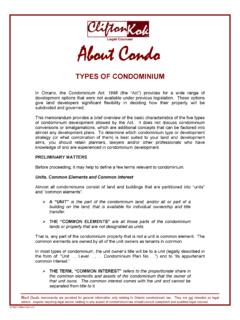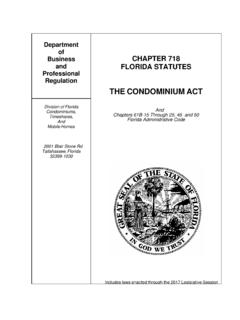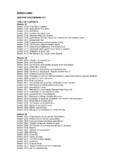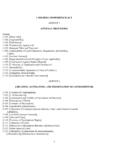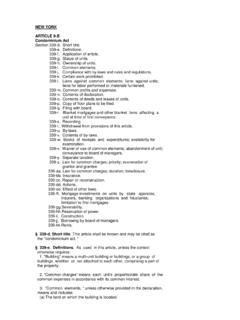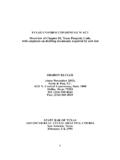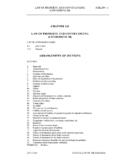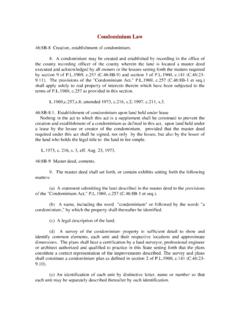Transcription of CONDOMINIUM ASSOCIATION RESERVE FUNDS …
1 CONDOMINIUM ASSOCIATION RESERVE FUNDS D. Douglas Alexander Attorney And Counselor At Law Whether you serve as a volunteer officer or director of a CONDOMINIUM ASSOCIATION or simply own a unit, it is very important to understand what RESERVE FUNDS are, why they are needed and why they are important to you and your ASSOCIATION . This article will present an overview of this topic and hopefully serve as a starting point for directors seeking information on how best to proceed on behalf of their own ASSOCIATION . Most CONDOMINIUM associations should have more than one type of RESERVE fund since there are different needs involved. However, the one most commonly referred to is the capital replacement RESERVE fund . The Michigan CONDOMINIUM Act mandates that every ASSOCIATION establish this RESERVE fund . MCL provides as follows: A RESERVE fund for major repairs and replacement of common elements shall be maintained by the associations of co-owners.
2 The administrator may by rule establish minimum standards for RESERVE FUNDS . The administrative rules pursuant to the CONDOMINIUM Act are even more detailed. Rule 511 states as follows: 1. The bylaws shall provide that the ASSOCIATION of co-owners shall maintain a RESERVE fund for major repairs and replacement of common elements in accordance with section 105 of the act. The co-owners ASSOCIATION shall maintain a RESERVE fundwhich, at a minimum, shall be equal to 10% of the ASSOCIATION s current annual budget on a noncumulative basis 2. The FUNDS contained in the RESERVE fund required to be established by section 105 of the act shall only be used for major repairs and replacement of common elements. 3. There shall be set aside the amount of FUNDS required by subrule (1) of this rule by the time of the transitional control date. The developer shall be liable for any deficiency in this amount at the transitional control date.
3 4. The following statement shall be contained in the bylaws: "The minimum standard required by this section may prove to be inadequate for a particular project. The ASSOCIATION of co-owners should carefully analyze their CONDOMINIUM project to determine if a greater amount should be set aside, or if additional RESERVE FUNDS should be established for other purposes." The rationale behind these laws should be fairly obvious. Associations generally have only one source of revenue: the assessments paid by the co-owners. The intent is to establish assessments that address future needs as well as the current expenses of the ASSOCIATION . Since very few associations have succeeded in borrowing FUNDS for major repairs (owing to the fact that they do not own the land or have anything else of value to offer up as collateral for a loan), the idea is to assess the monies gradually over time to avoid a cash shortage when some major repair must be immediately funded.
4 For example, shingled roofs tend to require major repair or replacement after approximately 15 to 20 years. If the ASSOCIATION has no RESERVE fund when the roofs reach the end of their expected useful lives, the ASSOCIATION will find itself in a difficult predicament. Leaking roofs will mean unhappy co-owners and possible lawsuits for water losses and other structural damage to the buildings. Meanwhile, lacking the FUNDS to pay for new roofs and any way to borrow the money, the ASSOCIATION will have no choice but to levy a substantial additional assessment against all the units. (This is often (erroneously) referred to as a special assessment ). This will take time to collect and may result in some co-owner hardships and the need to spend still more money on legal fees to force collection from those who are unwilling or unable to voluntarily pay.
5 Meanwhile, the roofs continue to leak while the ASSOCIATION struggles to amass the necessary FUNDS . If instead of the foregoing scenario, the ASSOCIATION has established and funded an adequate capital replacement RESERVE , the FUNDS will be available when needed. This avoids many problems. The roofs will be repaired before they begin leaking, thus avoiding co-owner claims for water losses and the co-owners having to endure the many problems associated with water entering their homes. Large additional assessments with their attendant hardships and legal ramifications can be avoided. Further structural damage will not occur. Unit resale values will be maintained and sellers will have fewer disclosures problems with which to deal. So why do so many associations fail to establish RESERVE FUNDS or fail to adequately fund those which they do establish?
6 The answer tends to be a combination of a lack of awareness and a reluctance to establish a realistic assessment structure. Many volunteer directors have no previous experience with CONDOMINIUM administration and are completely unaware of the provisions in the Bylaws or the CONDOMINIUM laws concerning RESERVE FUNDS . This is probably more often a problem at self-managed associations, although the fact that an ASSOCIATION has professional management does not always mean that the boards receive the information they need from their property managers. Unfortunately, some boards receive the information but choose not to act upon it. Sometimes the Board of Directors is comprised of people who are looking only at short term objectives due to the fact they do not intend to own their individual unit long enough for these major repairs to become needed.
7 Probably more often boards are reluctant to devote the time and money necessary to establish proper RESERVE FUNDS because it means raising the monthly assessment, which is very unpopular with individual co-owners. Of course, the individual co-owners are free to complain about an increased assessment since they are under no legal obligation to see to it that the assessment structure is adequate or that the RESERVE fund is established. On the other hand, those who serve on the Board of Directors run a personal liability risk when they choose not to adequately fund the ASSOCIATION s capital replacement RESERVE fund . Based on the cautionary language in the administrative rules and applying common sense, it should be clear that establishing a capital replacement RESERVE fund equal to only 10% of the ASSOCIATION s current annual budget will not do the trick.
8 We receive many inquiries about the meaning of the statutory RESERVE requirement, and many boards are happy to hear that the 10% requirement is not cumulative. In other words, the statute does not require that you set aside 10% of your budget each year for deposit into your capital replacement RESERVE . Rather, the statute merely says that at any one point in time, the capital replacement RESERVE fund should equal 10% of that year s total budget. However, associations who only maintain a RESERVE which complies with the statute will eventually find themselves in serious financial trouble, since that route will not lead to sufficient RESERVE accumulation. The question then arises as to how to establish a proper RESERVE fund . Although there are firms who will evaluate an ASSOCIATION s needs and make recommendations, most boards of directors should be able to handle the task on their own, particularly if they have the advice and guidance of an experienced professional property manager.
9 Generally speaking, the job boils down to identifying those common elements of the ASSOCIATION which will require periodic repair and replacement over time. It is then necessary to investigate and make a determination as to what their expected useful life will be at that particular project. The board can then collect cost data from local contractors, pricing guides at public libraries and other available sources to determine what each item would cost to repair or replace. That cost data can then be divided by the number of remaining years of expected useful life to arrive at the amount that should be placed into RESERVE each year until the item requires repair or replacement. Many people become sidetracked with the considerations involving the effects of inflation. It is important to bear in mind that although prices can generally be expected to rise over time, the FUNDS deposited into your RESERVE account should also be earning interest.
10 The rate of interest they earn will also vary over time as a function of inflationary pressures. Thus, the long-term effects of inflation are generally not as acute as one might otherwise expect. Attention should be given to the investment of the RESERVE FUNDS to assure that they will be available when needed and that the ASSOCIATION has maximized the rate of return on the investment without taking undue risks. We have always recommended to our clients that they not invest RESERVE FUNDS in any investment product where the principal itself is at risk. If the board chooses an investment product where the rate of return fluctuates, extra care and attention will be required, and it may become appropriate to get professional assistance in choosing such investment vehicles. The bylaws must always be reviewed to determine if they include limitations on such investments, such as a requirement that all ASSOCIATION FUNDS be deposited into accounts insured by agencies of the federal government.
